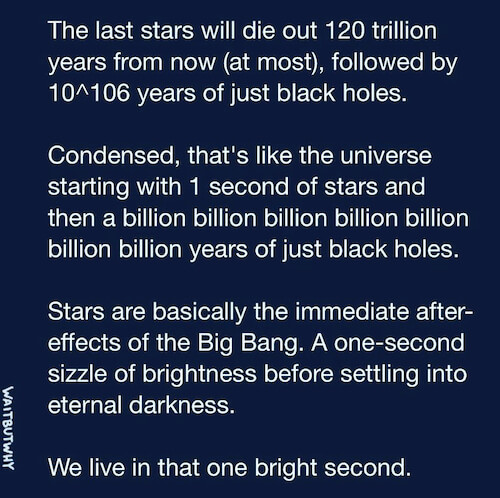
The last stars will die out 120 trillion years from now (at most) followed by 10^106 years of just black holes. Condensed, that’s like the universe starting with 1 second of stars and then a billion billion billion billion billion billion billion years of just black holes. Stars are basically the immediate after-effects of the Big Bang. A one-second sizzle of brightness before settling into an essentially endless era of darkness. We live in that one bright second.
A few days ago I wrote: “What will your tombstone legacy be?“. This lead to a dialogue with a family member about their desire to make a long lasting difference through, for example, planting trees. That family member is both a Doctor and also parent to three amazing children, so I said to them that they would already have left an amazing legacy through the many people they have helped and through their children. Their answer noted: “well the way I look at it our kids will pass on and so will their kids but our chance today is to improve the lives of many going forward with whatever improvement we can make in the future“. To some level, that family member dismissed the impact they have every day, as well as over time in supporting their children, the next generation, feeling a need to have an impact over a greater time period.
This reminded me of this quote that “we live in that one bright second”, a quote that gives a mind-blowing perspective on time.
My thoughts today, then, come from the power of recognising various time frames, from the tiny moments day to day, to focus and impact over days, weeks, months, years, decades, or even longer.
One business thought this week also came from a leader in the Insolvency business in the UK who was asked what can be done to support business leaders with distressed businesses to come forward and talk to an insolvency expert. One thought they mused on was the guilt that is often felt around winding up a business that has no financially viable future. They asked us to consider whether it can be better for the economy to wind up a business then start again, rather than to try to keep a distressed business limping along for years. They considered a ten year period and put the question out there that perhaps by taking emotion out and winding up so as to restart, the new business could potentially contribute far more through various taxes and fees as well as employment etc.
In the moment, a business leader in a distressed business may hold back from consulting an insolvency practitioner even when they know it is the right thing to do. However, if they consider a ten-year timeframe as discussed above, then this change in perspective may make that one dark second in time where they are feeling the stress of their distress, they may find the second is brighter.
